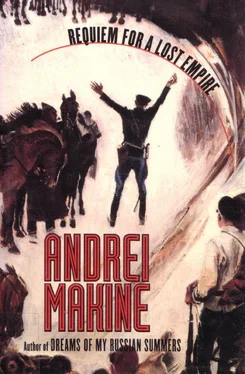After walking for several minutes I realized that I had left behind the book we used to take with us during those long days spent on the steppe beside the river. I told Sasha, ran back, and when I turned, saw her in the distance, all alone amid the limitless expanse filled with the translucency of the evening. I walked slowly, catching my breath, and watched her waiting for me in that absolute solitude, with the detachment that made her presence like a mirage. I was not thinking about the history of my family, of which she had just given me the last memories. I was thinking about her, herself, this woman who in a most discreet manner, almost accidentally, I might have believed, had taught me her language, and in that language had taught me about the land of her birth, the land that had never left her during her long life in Russia.
From afar I recognized her smile, the gesture of her hand. And with ah the ardor of my youth I made a silent oath to give back to her one day her true name and her native country, just as she had dreamed of it in the endlessness of this steppe.
"No, listen, let's face it, politically speaking the country's a corpse. Or rather a phantom. A phantom that would still like to frighten people but simply makes them laugh instead."
They were talking about Russia. I did not intervene. If I occasionally found myself at very Parisian gatherings of this type, it was never to join in the conversation. I accepted invitations because I knew that, in this highly composite world, there was always a chance I might encounter a guest who, learning where I came from, would exclaim, "Well I never! Only yesterday I met a compatriot of yours in Lisbon, at So-and-so's place. Now, what was her name?" In this way, at any rate, I imagined that, by questioning this providential guest, I could locate a trace of you, hold onto it, narrow down its whereabouts to a continent, a country, a city. For more than two years I had been patiently revisiting the places where your presence seemed to me likely, cities where, even briefly, we had once lived together. From now on, instead of this questing (I had often told myself that, logically, those must be precisely the cities you would avoid), I took to listening for some clue that might slip out amid the cocktail party chatter, between a couple of pronouncements on the subject of political corpses or similar pieces of conventional wisdom.
That day Russia-as-phantom scored a bull's-eye. The conversation took off.
"A black hole that swallows up everything thrown into it," someone added.
"They're allergic to democracy," affirmed the first.
A woman reaching out with her cigarette toward an ashtray said, "I've read somewhere that they now have a shorter life expectancy than in some African countries."
"That, darling, is probably because they smoke too much," declared her husband, playfully spiriting away her pack of cigarettes.
Everyone laughed. They changed the subject. On the pretext of going for another drink, I moved away, eyeing their little group among other circles that were forming and breaking up on the whim of a look, a word, a moment of boredom. The woman stubbing out her cigarette was a kind of minuscule adolescent, despite being in her sixties. Her husband, a former ambassador, was a tall, heavy man who, all the while he was listening (that is to say, pretending to listen) was raising his eyebrows in greeting to people over the heads of his interlocutors, then rejoining the conversation, diving in with a glancing remark. There was another woman, a high priestess of Parisian culture with a masculine profile and a voice like iron. Her very thin body, the expression in her eyes, and the movements of her chin seemed to be full of militancy for some cause. Below her short-cropped hair, her neck with its almost childlike delicacy, the last refuge of her femininity, belied this militancy and even she may not have been aware of its beauty. His eyes slid over yet another woman, an absolutely classic blonde who smiled and whom one had the impression of having already met a thousand times, until one penetrated through this gilded, smiling carapace to an unknown stranger. Finally, the young man who had just been speaking about the "phantom country." He was young at fifty and always would be. Black jeans, a white shirt widely unbuttoned to reveal a pale chest, an artist's mop of hair, elegant round spectacles. More than from this style of dress, the illusion of youth derived from his knack of always being up-to-the-minute. What he actually said mattered little, for during his long life as a teller of truths he had been a Maoist, a communist, an anti-communist, a liberal, an anti-bourgeois living in the most bourgeois district possible; he had defended every cause and its opposite, but, above all, he knew what you had to say to be perceived as a controversialist, a revolutionary, someone who could think the unthinkable, even while uttering banal propositions he would strenuously oppose the next day. At that moment the thing to do was to denigrate the phantom country He was a master of the sound bite.
As I was leaving I was stopped by a journalist I had met at one of these gatherings. "I'm going to cover your president's visit here with a Russian journalist. Maybe you know her, she's called…"
Walking through the night streets I told myself that the chances of discovering you again under a Russian identity were virtually nil. Especially alongside "our" president. However, it was the only means I had left for eliminating one by one the women who were not you.
The epithet "phantom country" haunted me for some time, like a tune you get on your brain but can't identify. And so did this regret: I should have intervened, tried to explain, told them that… Later, in the night, I thought about the phantom pain an injured man can feel after an amputation. He has an intense physical awareness of the life of the arm or leg he has just lost. I told myself that it was the same for one's native land, for one's country, lost or reduced to the state of a shade. It comes to life again within us, as both desolation and love, in the deepest throbbing of the severed veins.
"I should have talked to them about…" But what came into my mind was a silent image: that woman, alone, amid the immensity of the steppe, her gaze lost in the last glow of the sunset. I pictured this same woman, younger, at the start of the war, a nurse in a hospital in a little town beyond the Volga. Wards crammed with wounded, dying, dead. Surgeons operating day and night, collapsing with exhaustion. The earth resonating underfoot, thanks to the bombing, like a broad slab laid over a cavity. Trains arrive, discharge their cargoes of bodies, sticky with blood, mud, lice. Arms numbed by the weight of all these men who have to be carried, turned, lifted. In the tumult of cries one can no longer make out which mouth is calling out. Pain makes all look alike. And this is happening in a country in which both of the capital cities are under siege, the army is routed, the towns laid waste. A phantom country.
She had never called it that, had certainly never said to herself, "I am a foreigner, this country isn't mine, I don't have to suffer the extreme fate of this people." During a bombing raid a piece of shrapnel had maimed the fingers of her right hand. Since then she had worked from dawn till dusk and often through the night sorting men in transit at the switching yard among the trains setting off for the front and returning from it.
I remember that, as I was taking my leave of the people with whom I had spent the first part of the evening, I heard someone remarking that the price of real estate ("in central Paris, in any event," the girl-woman qualified) was about to go up again.
The winter night was warm, the rain at the open window split up the city's glow into an infinity of twinkling lights. Myriads of luminous dots spread out before me, a crude symbol of human dispersal: to discover a lost person all you would have to do would be to visit each of these sources of light, one after another, over the whole planet. Often in my despair this infinite sifting of the lights seemed to me achievable.
Читать дальше










